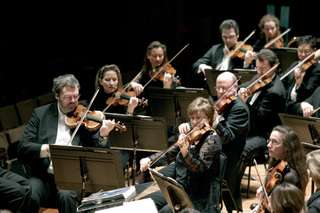|
Back
The Unexpected Return of Fabio Luisi Hong Kong
Hong Kong Cultural Center Concert Hall
03/18/2010 -
Ludwig van Beethoven: Overture from ‘The Creatures of Prometheus’, Op. 43
Wolfgang Amadeus Mozart: Sinfonia Concertante in E flat major, K. 364
Franz Schubert: Symphony No. 9 in C major, D. 944, ‘The Great’
Benjamin Schmid (violin), Maxim Rysanov (viola)
Philharmonia Orchestra, Fabio Luisi (conductor)

Philharmonia Orchestra (© Richard Haughton)
Hong Kong concertgoers must not be unfamiliar with conductor Fabio Luisi who led the Staatskapelle Dresden to the Cultural Center last year (read here). After one year, at the same place, Fabio Luisi stood on the same podium conducting the Philharmonia Orchestra to substitute Christoph von Dohnányi who withdrew due to sickness. Being one of the highlights of this year’s Arts Festival, the concert on Thursday was a full house event. Many ‘well cultivated’ audiences were desperate to hear the sound of this legendary British orchestra.
The concert was opened with Beethoven’s Overture to the ballet music The Creatures of Prometheus. It was understandable why the orchestra chose this piece as their curtain riser – it brought the ensemble’s utmost discipline to full play. The opening chords were too synchronized that the timpani almost sounded earlier then the other parts (this is a basic orchestral technique for playing a tutti chord). The strings were also with supreme dexterity and cleanness. Though Maestro Luisi adopted eight double basses for this Classical overture, the texture was never ponderous; rather, melodies at each voice could be discerned with lucidity.
The following Sinfonia Concertante by Mozart saw a significant reduction in the orchestral size. Throughout the three-movement work, there was a wonderful inflection of dynamics and phrasing under which every vestige of light and shade was brought to the surface. But it was this romanticized interpretative approach that sacrificed the simplicity and sincerity, paramount elements of Mozart’s music. Especially when my ears were still attuned to the tonal innocence of the Freiburg Baroque Orchestra (read here for the review of this concert), Maestro Luisi’s reading sounded too stodgy and over-specious. In the tragic middle movement, for instance, every phrase was perhaps too polished and slick that the music’s emotional intensity was nowhere to be found. The elegant and refined account of the third movement somehow slackened the vivacity and exuberance as well. There was an intimate collaboration between the two soloists, not just in terms of their dynamics, but also the every detail of articulations. It is indeed of immense challenge to achieve an immaculate balance between the two solo instruments in this work. But Mr. Schmid’s tone was never too domineering and rapt dialogues between the violin and the viola were eloquently conveyed.
Schubert’s The Great Symphony after the intermission was an elegant and majestic rendition. The silken strings, the velvety blend of clarinets and oboes, and the round-edged trombones all led to an exceptional quality of elegance. The march-like second movement once again tellingly exemplified the orchestra’s utmost discipline and technical assurance. But what were missing in this interpretation were some spellbound moments that can let the audience take home. The variety-lacking repeated motif in the opening movement gradually became boredom. I would have welcomed some more rapt expressivity from the woodwind solos in the second movement too, though it was rendered with tonal beauty and polished surface. Was it because the substitute conductor could not fully utilize the capacity of the orchestra, or the players did not comprehensively realize and execute the conductor’s intention? It is hoped that their performance on Friday evening could be more impressive to the audience.
Philharmonia Orchestra’s Website
Danny Kim-Nam Hui
|